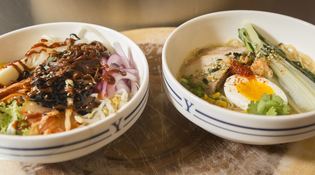 loading
loading
From the EditorNot on the menu, to our regretThere was so much more that didn’t fit in our food issue.  View full imageThe former editor of Wired magazine, Chris Anderson, once gave a talk in which he proposed that the job of a print magazine editor is to say no. Editors of online sites, which have infinite space and instant searchability, can be more hospitable. But a print magazine must accept only the most interesting and/or important topics, he said, because a magazine has to be splendid. His PowerPoint slide for that idea was a photo of a Fabergé egg. Personally, I think a good magazine should be less baroque and definitely more meaningful than a Fabergé egg. But it’s true that there‘s only so much space in a print publication. And what do you do when the problem isn’t substandard topics—but rather that there are many more interesting and important topics than you can possibly cram between the covers? As we were putting this special food issue together, we felt less like Fabergé artisans than like Yale admissions officers, anguishing over how to choose among too many superqualified candidates. There are a multitude of Yale alumni doing interesting things in food, and we did our best to assemble a list that conveys their range of specialties, cuisines, ages, and regions. But we’d wanted to include many more. So I’m listing a few of them here. Katie Parla ’02 has written or edited 20 books and travel guides, many of them on food—such as Tasting Rome (2016). At Yale, she studied art history; at the University of Rome Tor Vergata, she earned a master’s degree in Italian gastronomic culture. (And then there’s that sommelier certificate.) Visit her blog, KatieParla.com, for recipes such as Frittelle di Zucchine and Peaches with Wine. Eldon Scott ’84 is president of Urbanspace, a New York City real estate developer that “make[s] markets” by bringing shops and eateries together in congenial places. Urbanspace Vanderbilt, near Grand Central Station, houses 20-plus “artisanal and chef-driven food concepts.” Scott told the Center for an Urban Future, “We’re dealing almost exclusively with small independent businesses. . . . Because of that, you end up with more unique and more quirky products.” Diana Lovett ’01 loves chocolate. She also majored in African studies, earned a master’s in international development studies at Cambridge, and has held six different jobs and fellowships addressing humanitarian issues. She founded Cissé, a company that sells chocolate baking mixes and hot cocoa, all made with organic fair-trade beans grown by small producers. John Wargo ’84PhD, the Tweedy-Ordway Professor of Environmental Health and Political Science, studies the risks to humans from pesticides and toxins in foods. In Green Intelligence (2009), he noted that “most individuals carry in their bodies a mixture of metals, pesticides, solvents, fire retardants, waterproofing agents, and byproducts of fuel combustion.” He is now working on a book about the global food system and its effects on the environment and human health. Derick D. Dailey ’14MA has been working against hunger since he graduated from college, primarily as a volunteer with the nonprofit Bread for the World; he has served on its national board, on its executive committee, and as a co-convenor of its Pan-African Young Adult Network. He has also researched food and race in the Mississippi Delta. These last two areas especially—hunger and the environmental impacts of food production—are ones we’d like to revisit. If you have any suggestions for topics, let us know. We’d like to say yes.
The comment period has expired.
|
|